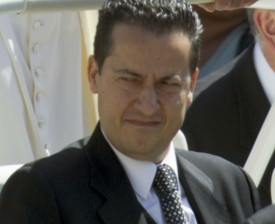A papal family in crisis at heart of Vatican butler’s trial
VATICAN CITY — For all the resonance of the trial of Pope Benedict XVI’s butler wrapping up on Saturday, the drama revolves around a tiny group — the “pontifical family” and the tight-knit Vatican community.
The core of the trial is the unique bond and ultimate betrayal of the trust between Paolo Gabriele and the pope in the context of a tradition-bound institution that has kept the trappings of a royal court from the Middle Ages.
Gabriele, who lost his own father at a very young age, told the trial that he would often have lunch with the pope and other members of the “family” — the pope’s two secretaries, a German nun and four Italian housekeepers.
It was in this context “when one can open up more easily” that the loyal butler said he became convinced that the 85-year-old pontiff was not being fully informed of important matters and perhaps even being “manipulated”.
Gabriele said he loved the pope “as if I was his son” and a Vatican spokesman earlier said the pope also “loved and respected” Gabriele.
Article continues after this advertisementVatican spokesman Federico Lombardi added that the pope, who has been following the case, was “particularly hurt” by Gabriele’s actions.
Article continues after this advertisement“The pope is a witness to a case which touches him closely,” Lombardi said.
The butler was so trusted that he had a computer and a desk in the same room as the pope’s secretaries next to the papal study and carried out chores on their behalf, even drafting some of the less important letters himself.
He said he had “calmly” photocopied hundreds of confidential papers using a photocopier in that office right under the noses of the pope’s secretaries — a way of backing up his claim that he was more a whistleblower than a thief.
“His closeness to the Holy Father was extraordinary,” Sandro Magister, a Vatican expert, said in an interview with online daily IlSussidiario.net.
“There was an extreme ease in passing confidential papers,” said Magister, adding that the scandal dubbed “Vatileaks” was “a snapshot of a Curia system in which familiarity and mutual trust prevail over security precautions”.
The pope’s main secretary, Georg Gaenswein, a hugely influential but low-key Vatican figure, and one of the pope’s housekeepers, Cristina Cernetti, said they did not suspect Gabriele in the slightest before the leaks went public.
The testimony of Gaenswein, Gabriele’s direct superior, was one of the most dramatic moments of the trial. When he appeared on Tuesday looking sombre in a long black cassock, Gabriele stood up in an apparent latent sign of deference.
Gaenswein did not look at Gabriele at first during his testimony but later turned at his seat for one pitying gaze at the man he had trusted so much since Gabriele took up the post in 2006 soon after Benedict’s election in 2005.
Outside of the pontifical “family” Gabriele said he had a wider social network of Vatican officials who would sometimes ask him because of his position to intercede for personal favours or would vent their frustrations.
Sometimes he said he would drive from the pope’s apartment to his own home just three or four minutes’ walk away so as to avoid being approached.
— World of petty rivalries —
This world of petty rivalries and jealousies — particularly over prestigious appointments — is one that is usually hidden from the public eye.
The idea of social interactions between Gabriele and some high-ranking members of the Curia is hardly a surprising one given the tiny community of the Vatican, the world’s smallest state with a population of just 832 people.
One example that Gabriele gave was what he defined as the “unjust treatment” of the chaplain of the Vatican gendarmerie, Monsignor Giulio Viviani.
The prelate was sacked apparently for defending some officers against their commander, according to I.Media, a news agency specialising in the Vatican.
There was one issue that touched Gabriele even more deeply — the mysterious disappearance in 1983 of Emanuela Orlandi, the teenage daughter of a Vatican employee and the centre of many conspiracy theories about the Vatican.
Gabriele is friends with Orlandi’s family and he brought the incident up in February when he spoke on condition of anonymity about his leaks.
“There is a kind of omerta against the truth, not so much because of a power struggle but because of fear, because of caution,” Gabriele said in the interview, using the term for the code of silence of the Sicilian Mafia.
